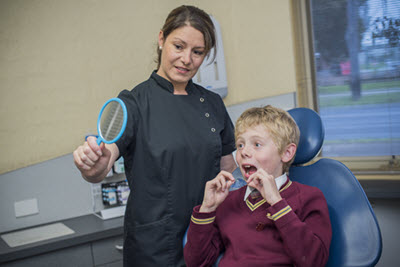
A mouthguard is a clear or coloured plastic device that fits over your teeth to protect them from any type of impact. If you or your child plays sport, a mouthguard may be a compulsory requirement before stepping up to play. If a mouthguard is not compulsory, you should still consider whether the use of one would be in the best interests of you and your family’s health and safety.
We see too many broken and missing teeth from sports that are not considered to involve contact, such as tennis or soccer and we would rather help you protect your teeth than go through the pain and expense associated with a tooth that has been knocked out.
Who Needs a Mouthguard?
Mouthguards are typically required when playing contact sports, such as football, hockey, soccer, basketball, boxing, and lacrosse. However, experts are now suggesting that mouthguards be worn by athletes playing non-contact sports, such as tennis and gymnastics. This is because playing sports puts you at a higher risk of damaging your teeth. Whether another player hits you, you fall, or a ball or piece of equipment hits you in the face, just one small accident could cause major tooth damage or even knock out one or more teeth. Using a mouthguard can prevent these types of injuries.
Types of Mouthguards
There are several types of mouthguards available on the market today, including:
- ready-made
- boil-and-bite
- custom made
Boil-and-bite mouthguards are the cheapest style available. They can be found in chemists or sporting goods stores and they only take a few minutes to form. The ready-made types are ready to be used as soon as you purchase them, but may need to be cut to fit your mouth size. Both styles of mouthguard can be extremely uncomfortable to wear and often players will discard them during play.
Custom-fitted mouthguards
Custom-made mouthguards offer the most comfort and protection because your dentist moulds them to fit the specific contours of your mouth.
The safety provided by custom fitted guards precisely made for a player’s unique mouth is superior to any off-the-shelf sports mouth guard.
If you’re regularly involved in a contact sport and would like to know more about custom fitted sports mouth guards, please contact us for an appointment.
Mouthguard Care
Mouthguards are prone to collect dirt and bacteria if not cleaned properly. It is important that you thoroughly wash your mouthguard after each use. Rinse it with cold water. You can also use a toothbrush and toothpaste or rinse with mouthwash on a regular basis.







